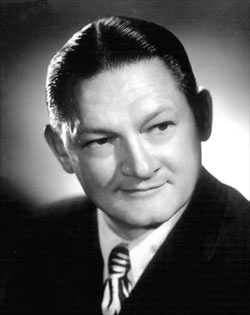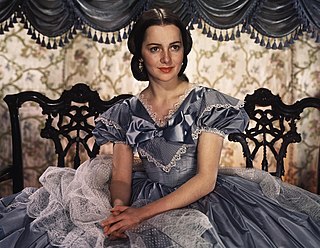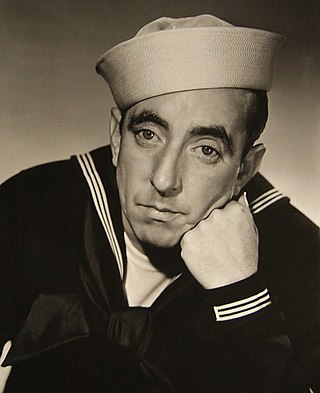Related Research Articles

Albert Victor Young was an American composer, arranger, violinist and conductor.

Stuart Erwin was an American actor of stage, film, and television.

Scott Hastings Beckett was an American actor. He began his career as a child actor in the Our Gang shorts and later costarred on Rocky Jones, Space Ranger.

Walter Plunkett was a prolific costume designer who worked on more than 150 projects throughout his career in the Hollywood film industry.

Jeffrey Lynn was an American stage-screen actor and film producer who worked primarily through the Golden Age of Hollywood establishing himself as one of the premier talents of his time. Throughout his acting career, both on stage and in film, he was typecast as "the attractive, reliable love interest of the heroine," or "the tall, stalwart hero."

Robert Warwick was an American stage, film and television actor with over 200 film appearances. A matinee idol during the silent film era, he also prospered after the introduction of sound to cinema. As a young man he had studied opera singing in Paris and had a rich, resonant voice. At the age of 50, he developed as a highly regarded, aristocratic character actor and made numerous "talkies".

Robert William Armstrong was an American film and television actor remembered for his role as Carl Denham in the 1933 version of King Kong by RKO Pictures. He delivered the film's famous final line: "It wasn't the airplanes. It was beauty killed the beast."

Lynne Overman was an American actor. In films he often played a sidekick.

The Golden Age of Looney Tunes is a collection of LaserDiscs released by MGM/UA Home Video in the 1990s. There were five sets made, featuring a number of discs, and each disc side represented a different theme, being made up of seven cartoons per side. The first volume was also released on VHS, with each tape representing one disc side.
Independent Theatre, formerly known as The Independent Theatre Ltd., was an Australian dramatic society founded in 1930 by Dame Doris Fitton in Sydney, Australia. It is also the name given to the building it occupied from 1939, now owned by Wenona School, in North Sydney, cited as Sydney's oldest live theatre venue.

Granville Bates was an American character actor and bit player, appearing in over ninety films.

Walter J. Vernon was an American comic and character actor and dancer.

Douglas Wood was an American actor of stage and screen during the first six decades of the 20th century. During the course of his career, Wood appeared in dozens of Broadway productions, and well over 100 films. Towards the end of his career, he also made several guest appearances on television. Wood died in 1966.
Brown Holmes was an American screenwriter who worked for several major Hollywood studios in the 1930s and 1940s.
Richard Macaulay (1909–1969) was an American screenwriter. He wrote a number of films with Jerry Wald while under contract to Warner Bros.
Tremlet C. Carr was an American film producer, closely associated with the low-budget filmmaking of Poverty Row. In 1931 he co-founded Monogram Pictures, which developed into one of the leading specialist producers of B pictures in Hollywood.
Karen DeWolf (1904–1989), sometimes known as Gypsy Wells, was an American screenwriter and novelist credited on over 50 films during her 20+ years in Hollywood. She's best known for her work on Columbia's Blondie films, in addition to movies like Nine Girls and Johnny Allegro. She also wrote a book, Take the Laughter, in 1940.

Lillian "Billie" Yarbo was an American stage and screen actress, dancer, and singer.
Libby Taylor was an African American character actress of the stage and screen who was active in Hollywood from the 1930s through the 1950s.
Harry L. Decker (1887–1959) was an American film producer associated with Columbia Pictures where he mainly oversaw production on western films. As an editor he was active in Hollywood from the 1910s through the 1930s. As a producer, he primarily worked on B-movie Westerns.
References
- 1 2 "Theatrical Mass Meeting Draws Public Approval". Newspapers.com. 28 Apr 1938. Retrieved 2021-04-02.
- ↑ "Candid Shots of Hollywoodland". California Eagle. 12 Aug 1937. Retrieved 2021-04-02.
- ↑ "To Play Lead". California Eagle. 4 Oct 1935. Retrieved 2021-04-02.
- ↑ ""Androcles" Moves to the Belasco". The California Eagle. 20 Jan 1938. Retrieved 2021-04-02.
- ↑ "Show Rally for Young Voters' Club Is Held". The California Eagle. 2 Apr 1937. Retrieved 2021-04-02.
- ↑ "Dewey-Bricker Negro Voters' Rally Held". The Oakland Tribune. 15 Oct 1944. Retrieved 2021-04-02.
- ↑ "Swank AKA Fashion Show Presented in Oakland". The Pittsburgh Courier. 28 Dec 1946. Retrieved 2021-04-02.